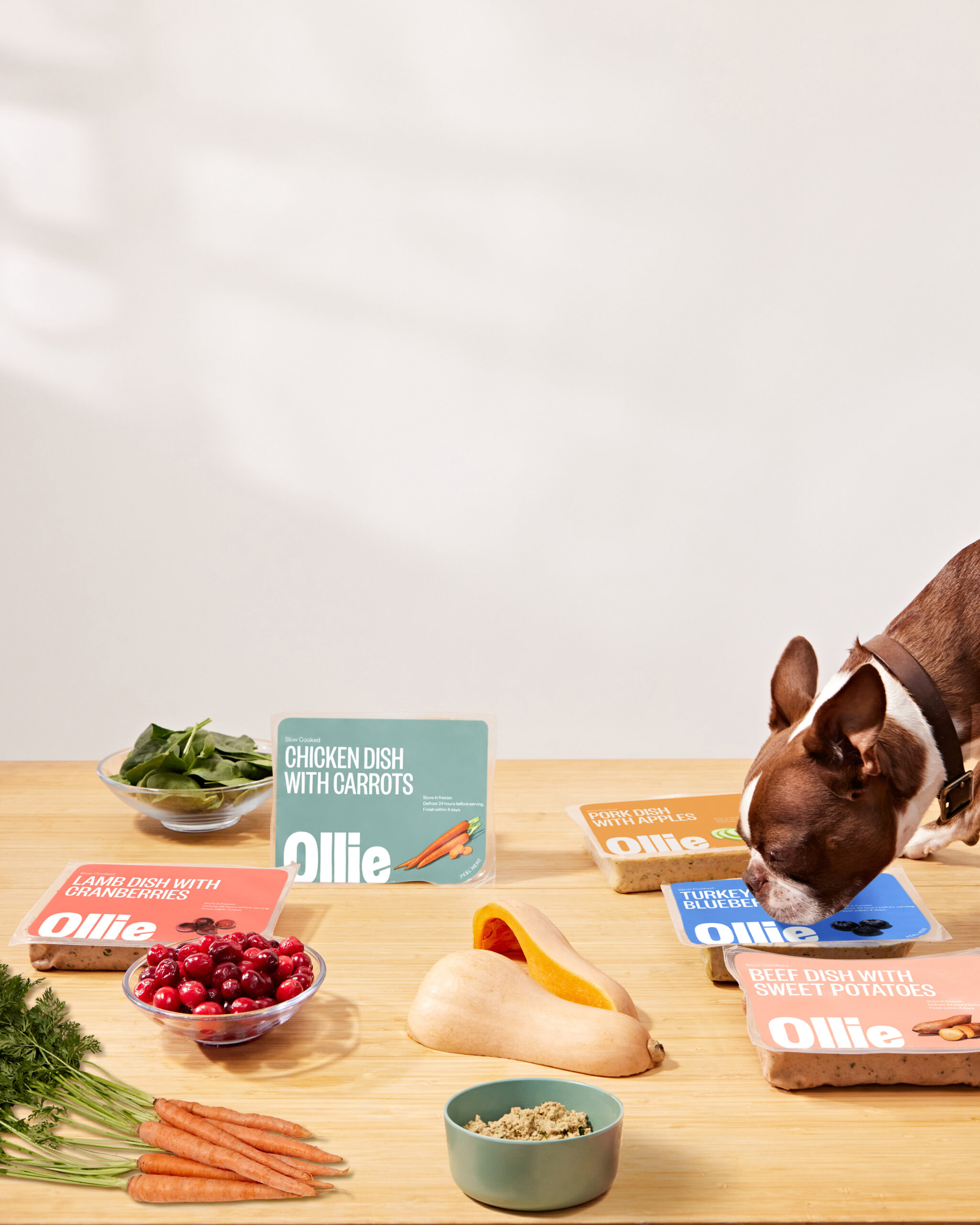Hey Ollie blog readers! We’re offering you an exclusive 60% OFF your starter box! Try now!
As responsible pet parents, we make sure to do our homework before choosing the right breed for our lifestyle. That means reading up on books, blogs, and forums, asking the opinions of our friends and family, and even seeking the advice of strangers at the dog park!
We want to know it all. The breed can determine how much exercise a dog needs, how they should be trained, and of course, how much food they need at every meal. But, we often tend to overlook the type of food that is best for particular breeds, usually just going by the vague recommendations on packages at the pet store.
How important is it that we select food based on breed, and what effect does it really have for the overall health of the pup? Today, we’ll examine this key question from every angle, and help you figure out the best food to buy for certain breeds.

Understanding a dog’s digestive system
Before getting into details, you should know some basics about the dog digestive system.
Like us humans, a dog uses its stomach and intestinal tract to digest food fully. But while most of our digestion takes place in the intestines (70%), it’s the other way around for dogs. That means the stomach does most of the heavy lifting for dogs, and every breed has super high levels of enzymes and acids to break down food after it’s scarfed down.
You may have noticed that dogs aren’t always big fans of chewing their food, so it makes sense that their stomachs must be equipped to get the job done. With that in mind, remember that there is no biological difference in the digestive structure between one breed to the next, only the size and length of the organs at work. A miniature poodle has the same digestive process as the big dogs and every breed in between.

The subtle breed differences
With all that said, there are a few key things to note when selecting dry food at the store, mainly the size of the pieces of kibble you pour into the bowl. Food should always be bite-sized, but every dog has a different sized bite! Large labradors and shepherds will have food pieces up to three times as big as toy dog breed food.
Macronutrient breakdown will also vary slightly from one breed to the next, but physical activity level and age are more important factors when determining levels of protein, fat, and carbs.
We’ve found that for most commercial dog foods, the basic components don’t differ.
The folks at Rocky’s Retreat did a deep dive into the various types of food marketed at different dog breeds and discovered little variation in content.
At the top of the list for most dog food ingredients is “chicken by-product meal”, which should raise red flags right out of the gate. While it may have a few grams of real meat and some residual chicken flavor, you have to recognize that this ranks as one of the least reliable and least healthy protein sources.
On the carbohydrates front, the most common products listed are “brewers rice” and “corn gluten meal”, neither of which are the most high-quality carbs on the market. Not only is brewers rice the most sugar-laden rice, but it can also lead to insulin issues. Yes, there’s such a thing as doggie diabetes! Corn gluten meal is also low in vital nutrients, and isn’t great for digestion, either.
Finally, we see “dried plain beet pulp” as a common ingredient in these products. Although this stuff may provide some antioxidants and check the box for providing vegetables, it simply does not deliver the same level of nutrition, vitamins, and minerals as real fruits and veggies.
You don’t need a degree in nutrition to see that these ingredients are not optimal, and over the course of a doggy lifetime, they can cause some avoidable problems. According to a renowned Tufts veterinarian, it’s well known that the majority of breed-specific claims on most commercial dog food packages aren’t actually legit. What’s far more important is the quality of the ingredients within.

Addressing specific health issues
According to Pet MD, food that targets specific health conditions is way more vital to your dog’s well-being than food that claims to be formulated for a particular breed.
Vets know that a dog’s nutritional needs will change over the course of a lifespan, and certain health issues can arise that demand a new type of food.
Here are a few common pup health conditions that demand a change in diet:
- Gastrointestinal issues mean your dog should be eating more complex carbs and cut down on the fat or protein to calm the digestive system.
- Hypertension and high blood pressure require a reduced-sodium diet and ideally fewer processed ingredients.
- Gluten or carb sensitivity should mean limited corn and grain, and meals should include alternatives like legumes, lentils, and berries as carb sources.
- Tapeworms and parasites usually indicate sugar levels are too high, and food must be higher in protein and healthy fats to starve the bug.
- Skin and coat problems are common for dogs with lots of hair, since dead skin cells can build up and lead to infection. Grooming is the best way to handle these issues, but a diet high in omega 3 fatty acids can also smooth things out. Arthritis and other issues related to joint and bone health are very common, especially for bigger doggies. Whole-food ingredients packed with protein and fat are essential to keep them strong inside and out.

Customized feeding solutions
While many medical solutions exist to these problems, it’s always preferred to make dietary tweaks that get to the root, rather than applying band-aids that only treat symptoms.
We’ve seen people turn their entire lives around just by making commitments to new ways of eating, and the same can be done for dogs if you have the right information and support.
Unlike some of the questionable ingredients in dry food we pointed out above, veterinarians recommend whole foods cooked right, just like our doctors suggest for us as humans.
The truth is that most of the main ingredients listed on these store-bought dog foods are the same. They may be listed in different orders or have unique flavors, but the ultimate result on your dog’s health does not vary.
At Ollie, we don’t accept this low standard, which is why we commit to using only the highest quality whole-food ingredients in every meal.
Real lamb, chicken, turkey, and beef kidney are some of the best-digesting proteins for dogs, so that’s what we use. For carbs, we rely on stuff like sweet potatoes, peas, and blueberries, all of which provide healthy, sustained energy and minimize blood sugar spikes. Finally, the fat we use in our recipes is mainly from cod liver oil, and chia seeds, both certified superfoods that we see in the healthy section of the grocery store.
Keep in mind that we don’t just serve up dry kibble in a bag. Instead, we cook fresh batches of tasty, fresh food that comes in many popular recipes.
This is not like other subscription services that bring the same old thing to your door every month. We’re constantly switching things up to keep it interesting for you and your dog!
On top of that, your doggie meal plan can be adjusted on the fly, based on factors like changes in activity level, allergies, health concerns or age. We give you a huge amount of control over your dog’s plan, and provide you with the expert advice you need to ensure optimal health.
This is far from a one-size-fits-all product. It’s a custom diet solution that makes a real impact on the health and happiness of your pup!
So, should you feed based on your dog’s breed?
As it turns out, there isn’t a huge effect on the nutritional makeup of dog food based on breed.
Veterinarians have instead determined that the size, shape, and quantity of dog food is far more important, and fresh food is the best possible option for every type of dog.
Even better than the store-bought bits are customized diets that are designed specifically for your dog’s lifestyle and health protocols.
If you think it’s time to raise the bar for your dog’s daily nutrition, be sure to check out the full lineup of Ollie products and follow us on instagram for all things dogs and special promotions.
Tagged As:

The nutrition your dog needs,
the food they want.

Enjoying our articles? Subscribe our Newsletters and get new articles directly to your inbox
You might also like
4 June 2025
7 MINS READ
Feed Their Future: Why Human-Grade Food Matters for Puppies
Among the many decisions you’ll make as a new pet parent, choosing the right food for your growing puppy is one of the most important. The quality of your puppy’s diet can impact their developme…
by Ollie Pets
4 June 2025
6 MINS READ
How Does Fresh Dog Food Compare to Homemade?
As pet parents become more conscious about what goes into their dog’s food bowl, many are considering alternatives to traditional kibble. Two increasingly popular options are fresh dog food and ho…
by Ollie Pets
4 June 2025
5 MINS READ
How Can Fresh Dog Food Help with Weight Management?
Maintaining a healthy weight is one of the most important aspects of your dog’s overall health and longevity. Being overweight or underweight can result in health complications and conditions that…







